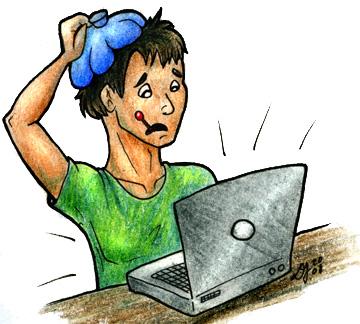Diagnosed by the virtual doctor

Illustration by Dana Larson
January 23, 2008
From the poor to the mega-rich, everyone can catch a cold. Money and privilege are no guarantee of health, a facet of our society in which there are no guarantees to be had. Health issues are reflected in our newspapers and magazines, on the radio, television and in our cinemas.
Millions tune in to health-themed programming like “House”, “Grey’s Anatomy” or “E.R.” on a weekly basis. The Internet, as it is on so many other subjects, is filled with health information and advice.
With the abundance of health information in the media, how much will the average person be affected by what they see? Who are we to trust: our friends and neighbors, the man in a lab coat on the evening news or only our own doctors?
Ryan Hurley is a graduate student in LAS. He is writing his dissertation on how people find health information from the Internet and what kind of information they are most likely to find.
He said he believes the health information people receive through media channels such as TV, radio, newspapers and the Internet can have a great effect on whether they take a personal interest in a health issue, but it is hard to predict what exactly will motivate people to act.
Get The Daily Illini in your inbox!
“It can be difficult to determine if health scares and media coverage always influences people to take precautions or take a particular action,” Hurley said. “You have to get people both to pay attention and to act. People do pay attention to people they are interested in, which means that celebrities have a better chance of influencing people with health messages. When people see celebrities getting checked for various diseases, it is one of the few things that seems to statistically motivate people to take an interest.”
At least some of the country seems to be interested in health issues; when Google News released the top searches in 2006, the word “cancer” came in third place, behind “Paris Hilton” and “Orlando Bloom.”
Hurley believes the Internet is the most important of the new generation of health sources.
He added that the ease of use combined with the privacy of diagnoses via Internet searches appeals to the average person.
“People treat the Internet sort of like a virtual doctor,” Hurley said. “They can type their symptoms into a search engine and get diagnoses instantly. They also have total privacy this way, so they turn to the Internet increasingly, both before and after going to a doctor.”
Even with the rise of Internet symptom-searching, Hurley stressed that most people still prefer getting their information from people they know and from their doctors.
He added, though, that most people’s most direct link to health news is through the media.
“I think the media has a lot of influence over the average person’s perception of health,” Hurley said. “What I am trying to answer is how and why the media’s effect is so great and in what situations.”
On Martin Luther King Day, as most of the campus enjoyed a day off, the coughing, sniffling masses converged on the McKinley Health Center for diagnoses and prescriptions. Marcy Scherer, senior in LAS, sat nursing a sore throat, waiting for the call that a doctor’s room was ready. She said that she got the majority of her health information from the Internet.
“I Google my symptoms, sure,” Scherer said. “I don’t know how useful it really is, but I feel like it’s still a good resource. I trust the doctors more, but what I see online might help me decide to come in to the doctor’s office in the first place.”
Scherer said she believes celebrity attention to health issues in the media are helpful in that it helps people become interested in the subjects.
“I don’t pay attention to it myself, but if it makes people go out and get checked for various illnesses, then good for them,” Scherer said.
Priya Mazumdar, a graduate student in LAS and another McKinley patient, agreed with Scherer that to her, the most important function of the media concerning health was to increase awareness of important issues.
“My family has a lot of doctors, so I never worry about diagnoses from family,” Mazumdar said. “But it is the job of the media to keep people informed, and I think that information should come from trained professionals and not actors or actresses.”
Poor McDreamy would be crushed.






